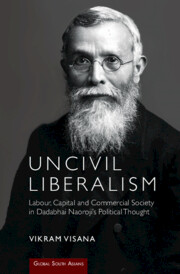Book contents
- Frontmatter
- Dedication
- Contents
- List of Abbreviations
- Acknowledgements
- Introduction
- 1 Sociality in an Imperial and Industrial Age
- 2 Sociality and the Parsis of Western India
- 3 Civil Society and Social Reform
- 4 Conceptualizing the Drain Theory
- 5 Making Commercial Society in India
- 6 Making Commercial Society in Britain
- 7 The Afterlives of Naoroji’s Political Thought
- Conclusion
- References
- Index
7 - The Afterlives of Naoroji’s Political Thought
Published online by Cambridge University Press: 27 September 2022
- Frontmatter
- Dedication
- Contents
- List of Abbreviations
- Acknowledgements
- Introduction
- 1 Sociality in an Imperial and Industrial Age
- 2 Sociality and the Parsis of Western India
- 3 Civil Society and Social Reform
- 4 Conceptualizing the Drain Theory
- 5 Making Commercial Society in India
- 6 Making Commercial Society in Britain
- 7 The Afterlives of Naoroji’s Political Thought
- Conclusion
- References
- Index
Summary
In 1917, at the venerable age of ninety-one and only four months before his death, Naoroji reassured the Indian Legislative Council that the new problem of terrorist ‘anarchism in India’ resulted from ‘propaganda’ and ‘dangerous conspirators’ rather than the innate Indian propensity for political violence. The Grand Old Man's reassurances allayed British fears about anti-colonial revolution but also reflected the creeping worry among Indian ‘moderates’ that a harmonious society predicated on a liberal model of civil peace was moving further out of view.
The rise of an antagonistic politics buttressed by British strategies of divide and rule threatened to undermine any long-term dreams of multicultural sociality. The founding of the Muslim League in 1906, and its lobbying for minority representation for Muslims, culminated in the separate electorates of the 1909 Morley–Minto Reforms. It is telling that Naoroji welcomed such reforms that increased Indian political representation in order to train a larger Indian clerisy of reformers. This was a means to an end, that of plugging the drain rather than a plebiscitary upscaling of Indian popular sovereignty and the establishing of a constituent power. Instead, Naoroji focused on a rules-based ‘constitutionalism’ to govern social issues and replacing the arbitrary will of British officials. He continued to believe that Indian peoplehood depended on a commercial sociality and implored the British that the scrapping of all despotic economic monopolies was the only way to reach that goal. It is hardly surprising, then, that all of Naoroji's letters on the topic of constitutional reform were qualified with the primary demand for simultaneous civil service examinations.
The new question of political representation did dilute the relevance of Naoroji's drain theory for card-carrying Indian liberals for whom political economy was, by this stage, an epiphenomenal but not a fundamental factor in imagining Indian liberal subjectivity. Surendranath Banerjea, V. S. Srinivasa Sastri and Tej Bahadur Sapru founded the Indian National Liberal Federation in 1910 as the Indian National Congress became more radical in its aims and tactics. Pushing for greater political representation, they promoted federalism and decentralization as a gradualist solution to Indian responsible government, which increasingly obscured Naoroji's ideal of commercial society and elided the question of social interdependence.
- Type
- Chapter
- Information
- Uncivil LiberalismLabour, Capital and Commercial Society in Dadabhai Naoroji's Political Thought, pp. 184 - 201Publisher: Cambridge University PressPrint publication year: 2022

